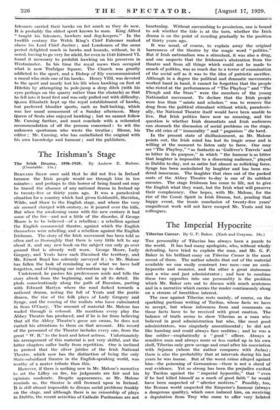The Imperial Hypocrite
Tiberius Caesar. By G. P. Baker. (Nash and Grayson. 18s.)
THE personality of Tiberius has always been a puzzle to' the world. It has had many apologists, who, without wholly defending, have tried to explain the man, and Mr. G. P. Baker in his brilliant essay on Tiberius Caesar is the most recent of them. The author admits that out of the material available we -can easily construct two • men—one an arch- - hypocrite and monster, and the other a great statesman and a wise and just administrator ; and how to combine . these two opposites into one personality is the problem which Mr. Baker sets out to discuss with much acuteness and in a narrative which carries the reader continuously along on a stream of breathless interest.
The case against Tiberius rests mainly, of course, on the sparkling partisan writing of Tacitus, whose facts we have to accept, but whose inferences from and comments on - those facts have to be received with great caution. The balance of truth seems to show Tiberius as a 'man who • believed in good administration but who, like most good, administrators, was singularly unsentimental ; he did not like humbug and could always face realities ; and he was a fine soldier—emphatically a " good " officer. Always a - sensitive man and always more or less curled up in his own shell, Tiberius only grew savage and cruel after his association with Sejanus (whom the author compares with Judas) ; there is also the probability that at intervals during his last years he was insane. But of the worst crime alleged against him—the .poisoning of Germanicus—there is not a shred of real evidence. Yet so strong has been the prejudice excited by Tacitus against the " imperial hypocrite," that " even if he had killed himself as a mark of good faith " he would have been suspected of " ulterior motives." Possibly, too, the Roman world suspected the Emperor's humour (always: a dangerous quality), which once induced him, on receiving a_ deputation from Troy who came to offer - very belated
condolences on his only son's death, to condole in return with them on the death of their late eminent fellow-citizen, Hector.
We do unreservedly commend this sane analytical study cf a curiously complex character, but we would just suggest that future editions should correct Brevariutn Imperii (thrice repeated), and that the genealogical table might be more fully and carefully constructed.

































 Previous page
Previous page